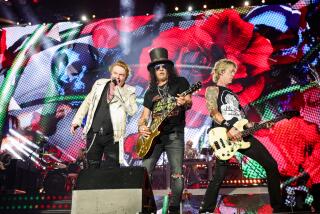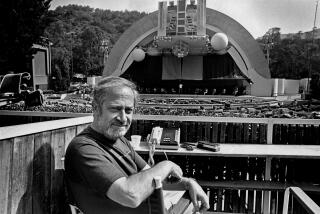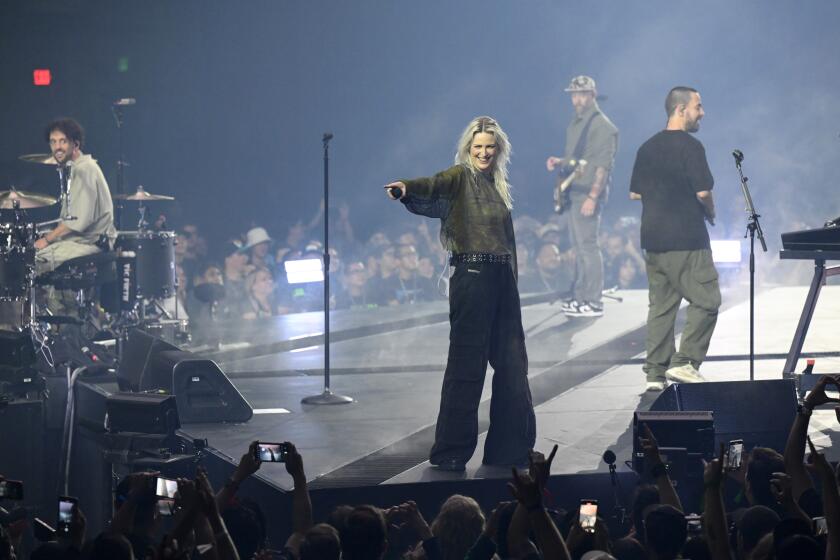Ronstadt and Harris Leave Past Behind
- Share via
“Feels like home,” Linda Ronstadt sang Monday at the Troubadour during the start of her first-ever duet tour with Emmylou Harris--and it did feel like home, in the best sense, for anyone familiar with the second golden era of the Los Angeles pop-rock scene.
Rock came of age here during the ‘60s when such pioneering groups as the Byrds and the Doors honed their craft in clubs around the Sunset Strip.
But the music scene blossomed again in the late ‘60s and early ‘70s, and the center was the Troubadour in West Hollywood. It was the era of the singer-songwriter, and the Santa Monica Boulevard club hosted the record industry’s most promising new artists--many of whom were turned into stars virtually overnight.
You felt some of that legacy Monday when Ronstadt and Harris included in their nearly two-hour set a few tunes by some of the outstanding writers of the early-’70s era, including Leonard Cohen, Jackson Browne, Randy Newman and Bruce Springsteen.
Ronstadt also shared her own memories of the club between songs, pointing out to the spot in the room where one of her heroes, Johnny Cash, introduced her to his 13-year-old daughter Rosanne, (whose song “Western Wall” was featured in Monday’s set) and joking about how she once “conspired” at the club to meet Randy Newman (who wrote “Feels Like Home”).
But the real link to the tradition of the Troubadour and the wider L.A. scene was Ronstadt and Harris themselves, both of whom were members of the bountiful pop-rock community.
The danger in this homecoming emphasis--they even both wore jeans Monday, which was the Troubadour dress code in the early ‘70s--was the possibility that they would let nostalgia do the work for them.
No way.
At a time when most pop music seems so disposable, it was refreshing to see these veteran artists create the same kind of excitement Monday that they would have a quarter century ago--and do it without taking shortcuts.
Even though the brief tour is designed to promote the pair’s new Elektra album, “Western Wall: The Tucson Sessions,” Ronstadt and Harris could have simply done four or five songs from the album and devoted the rest of the time to the tunes that established them as two of the most evocative singers of the modern pop era.
Instead, they sang all 13 songs from the new album in the set--and their voices blended beautifully.
Because Harris tours regularly, she seemed comfortable from the start at Monday’s invitation-only warmup date for the tour, which begins Friday in Reno. Ronstadt, who has done only limited touring in recent years, required a period of adjustment, frequently looking down at lyric sheets on a music stand.
Technically, Ronstadt has the purer and more powerful voice. But Harris compensates with more tailored phrasing and a soulful edge that reaches to the heart of even the most stubborn material.
Supported by a five-piece band that included guitarist Bernie Leadon (a founding member of the Eagles, who came together playing in one of Ronstadt’s ‘70s groups), the pair opened with Andy Prieboy’s “Loving the Highwayman,” the opening song on the new album.
Though it’s easy to see how the song’s theme about the restless pursuit of one’s dreams connects with these two veteran artists, the song--like a couple of others from the album--doesn’t have the kind of flowing melody that best fits their voices.
So it wasn’t really until Ronstadt kicked off the second number--Browne’s far more graceful “For a Dancer”--that you felt the full impact of these classic voices joining together.
Rather than sing everything together, each would take the lead on a particular number, with the other joining at some point on harmony. The songs--the best of which included Sinead O’Connor’s caressing “This Is to Mother You,” David Olney’s tender “1917,” Springsteen’s spiritual-tinged “Across the Border” and Harris’ own driving “Raise the Dead”--spoke about themes of resilience and loss, salvation and regret.
Listening to the purity and passion in their voices, it was tempting to think about the revolutionary impact Ronstadt and Harris might have had if they had gotten together back in the late ‘60s and early ‘70s when supergroups were all in vogue.
The problem is that it was hard enough at that time of male dominance in the music industry for women to even maintain their commercial momentum, much less think about joining together in a superstar-type group. And maybe it’s best that Ronstadt and Harris pursued individual paths, because their influence--especially Harris’ in the alternative country field--has still been significant.
But it’s also a delight for them to join at this point in their careers and demonstrate that they can still add stylishly to the Troubadour tradition they helped establish.
* Linda Ronstadt and Emmylou Harris play Sept. 13 at Humphrey’s, 2241 Shelter Island Drive, San Diego, 7:30 p.m. $55. (619) 523-1010.
More to Read
The biggest entertainment stories
Get our big stories about Hollywood, film, television, music, arts, culture and more right in your inbox as soon as they publish.
You may occasionally receive promotional content from the Los Angeles Times.










